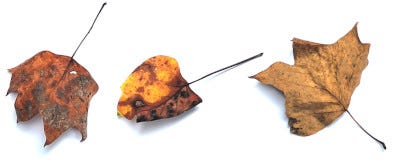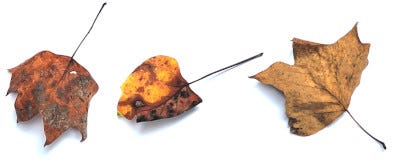"An unloved sweetgum is a trusty herald"
A sonnet to a tree that sheds leaves in late summer. A tribute to the sweetgum, a species I tolerate so long as it shades.
A while ago,
quipped on Notes that trees seem hardly “talked about”, and for some reason that’s stuck with me. Mark’s quip got a lot of responses from tree lovers, too.I don’t under-appreciate trees at all, and I do talk about them (though maybe not on Notes, where I usually just lurk). I certainly think about them, and especially now, when I should have already put up some split hardwood for winter’s fires. I think about them when the wind rises, too, and I wonder if an old one or two will fall on the power line out by the road or, heaven forbid, on the house. I have gathered fallen branches this summer — more than usually is the case — and stacked them for kindling.
Besides fears of deadfall or providing soothing warmth in cold months, there are of course the summer leaves in the canopy above us. Bond Girl Bride and I pay attention to them and notice their gentle color changes from early to late summer, when greenest greens give way to hint at grey or silver. Alloy of summer, I guess.
Some poetry, then, to celebrate trees and the passing of summer, even though August still mightily warms us in North Carolina. As I did in the last stab at verse, “Rosy-fingered dawn,” I’m showing the progression of drafts as they came out of my pen.
Rosy-fingered dawn
Read time: about 3 minutes, more if you study the handwritten drafts. This week: I know. I know. I said I’d go to a bi-weekly schedule. But I couldn’t help myself. Maybe I start with the bi-weeklies beginning today. Nothing new in the Boulangerie this week.
Here’s where the lines stand today:
Punched tickets strewn underfoot signal a summer's journey nearing fall's destination. They end here, brown, on the ground. The sweetgum offers these crisps as crumpled evidence of spent summer. "So, just so," she says, "summer begins to fail and fall to September's ambiguous guile -- his cool promises impetuously betrayed with heat." An unloved sweetgum is a trusty herald. Petalled atop in fresh spring, by late summer she casts some sable shards, though chastely holds most for autumn's yellow splendor. Browned and fallen early, her leaves announce an end to August's dry-roasted days.
How it evolved on paper
The first draft swirled around my intentions. The words disappointed, but at least they headed in the right direction, swerving off the road a bit to wade in the ditch and meander in the weeds. That’s okay with me, though, since it’s a “shitty first draft.”
I put the first draft aside for most of the day. Good to let the mind wander a bit as you do other things that need doing. I returned to the draft much later, and now that I think about it, I should have used a different color to show my revisions. I wrote out a clean copy of the wrestled-with piece the next morning.
The first draft, marked up (left), and the clean copy (right). On the website, you can click to expand the image:
I was thinking about a sonnet, but of course at this stage, line number didn’t count for much. No octet-sestet for me, and forget about scansion and rhyme! I just let the words hit the page. One thing that surprised me as I wrote the clean copy was line length. Lines were longer than I expected, and there was a lot of fluff floating around, it seemed: “Like used tickets strewn on an empty platform” … ugh.
The second draft brought things into more of a sonnet form, and the piece seemed to have a shape. This time I used a red fountain pen for revisions. My students will probably appreciate that I wield my red pen on my own writing, too! Here’s the first clean copy, marked up (left) and the second clean copy (right):
Clean copies reveal themselves, especially after a day or so. In the morning, I thought the first three lines wobbled a bit, invoking a journey, a train trip, a destination … but they didn’t seem taut enough. And I wondered, too, whether alliteration was just too cute and too frequent. This attempt didn’t hit the mark, either. Yet, at least.
The third draft — my final one before I put this post to rest — is not the last, I think. I did a clean copy, and I’ll set it aside for later. Again, the marked-up copy (left) and the clean copy (right).
You might have noticed small notations on the first draft, angled a bit and low on the page: “Aaron in tub” and “leaves like shirts on boys cast off in heat and lost.”
We do that in North Carolina summer. We cast off clothes, and because we live in the country we can lose more than our shirts sometimes. I was thinking about other metaphors for losing leaves, of course, and a photograph on the refrigerator came to mind, too. So, I share young Aaron in the tub in the clean copy.
I hope he doesn’t mind.
Post script: Google doc from
Saturday, August 26: Tom offered to annotate the sonnet in a comment, and he sent me a Google Doc link. His observations were useful to me, and in fact confirmed a couple of the thoughts I was having about a next revision.
Here’s the link, if you want to take a look: https://docs.google.com/document/d/1CiVPh-Jfv8Z5K1DYycDIUURqTUWLNHiprtda6GDbll0/edit?usp=sharing (I have to admit that I’m not sure if this works, but we’ll see, I guess.)
Got a comment?
Tags: sonnet, sweetgum, tree, summer, fall, seasons, autumn, leaves, leaf, revision, poetry
Links, cited and not, some just interesting
I’m not the only one to write verse for the sweetgum: Toomer, Jean. “Song of the Son.” Poetry Foundation. Accessed August 24, 2023. https://www.poetryfoundation.org/poems/53988/song-of-the-son; and Smith, R. T. “Sweetgum and Cedar.” Verse Daily. Accessed August 24, 2023. http://www.versedaily.org/2020/sweetgumandcedar.shtml.
Wise advice from Wendell Berry (for you, and everyone): Berry, Wendell. “How to Be a Poet.” Poetry Magazine. https://www.poetryfoundation.org/poetrymagazine/poems/41087/how-to-be-a-poet. I’ve sometimes thought that Wendell Berry was a grump, but he’s often got something useful to say, too.











I like all of Wendell Berry’s poem ... and big parts of yours :)
Wonderful, Mark - thank you for a terrific read! Lovely to read - and of course to see! - the different stages of your process. I hadn't heard of the sweetgum, so I looked it up. It's a type of liquidambar - a relation of one in our tiny front garden. It's about to change its clothes into glorious autumn colour!